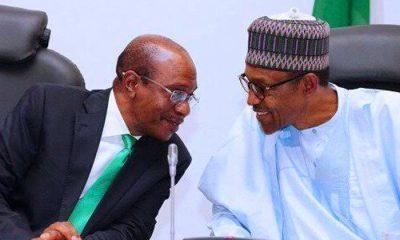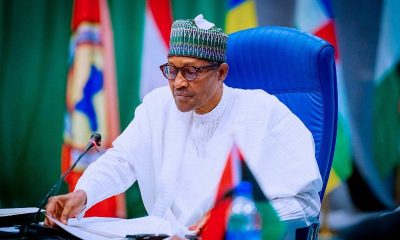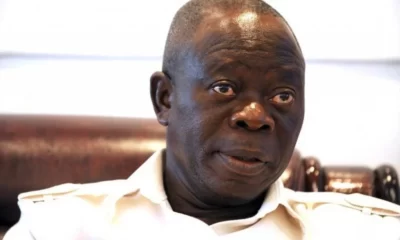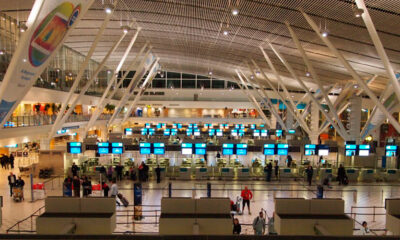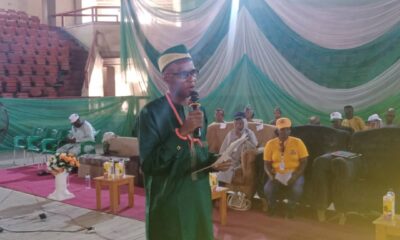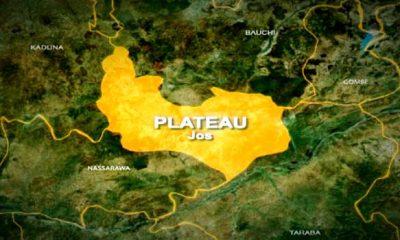Business
Companies Pay N11.5tn Tax Under Buhari – Report
Published
1 year agoon
By
Editor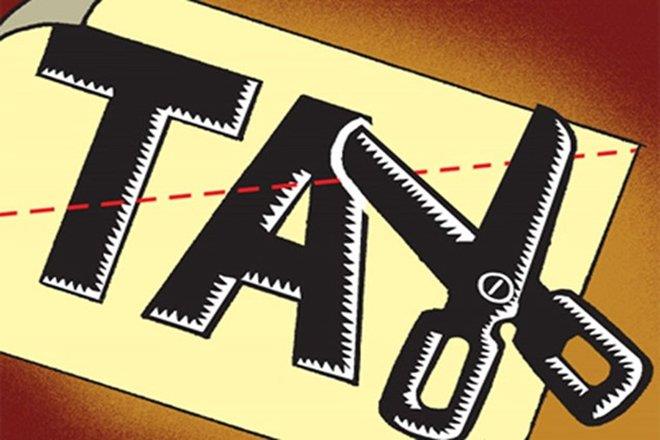
The Federal Government has raked in N11.5tn from taxes paid by business organisations under the administration of Muhammadu Buhari (retd), findings have revealed.
Data sourced from Company Income Tax reports published by the National Bureau of Statistics between 2015 and 2022 showed CIT collected by the Federal Inland Revenue Service stood at N1.3tn when the President assumed office in 2015 and dipped by 26 per cent to N1tn in 2016 when the country’s economy went into recession due a significant drop in oil prices.
It maintained an upward trajectory between 2017 and 2020, as the government generated a total of N5.3tn during this period.
READ ALSO: Alleged Defamation: Abiola’s Widow Seeks N100bn Damages From IGP
Companies Income Tax is a tax on the profits of incorporated entities in Nigeria. It also includes the tax on the profits of non-resident companies carrying on business in Nigeria. The tax is paid by limited liability companies inclusive of the public limited liability companies. It is commonly referred to as a corporate tax.
The CIT rate is 30 per cent for large companies (i.e. companies with gross turnover greater than NGN 100m), assessed on a preceding year basis (i.e. tax is charged on profits for the accounting year ending in the year preceding assessment).
The Federal Government earned N1.6tn from corporate tax in 2021 and made a record N2tn revenue from CIT in the three quarters of last year.
According to the data, the highest contributors to the CIT were the manufacturing, Information Communication Technology and financial services sectors.
Also a critical evaluation of 2022’s Company Income Tax records showed a significant hike in taxes paid by companies across the board.
For example, tax from firms in the information and communication sector rose by 158.51 per cent from N51.05bn in the third quarter of 2021 to N131.97bn in the corresponding period in 2022.
In the same vein, manufacturers paid the most taxes during the period in review, as the Federal Government increased the number of taxes collectable by the Federal Inland Revenue Services from 39 to 61 items.
READ ALSO: 2023: Now Is Time For North To Repay Tinubu’s Support – Shettima
Some of the new taxes as contained in the schedule to the taxes and levies (Approved list for collection) Act (Amendment Order), 2015, include “national information technology development levy, economic development levy, environmental (ecological) fee or levy; inter-state road taxes; mining, milling and quarrying fee; infrastructure maintenance charge; social services contribution tax, and wharf landing fee where applicable.
Others are entertainment tax, produce sales tax, property tax (where applicable); fire service charge; slaughter or abattoir fee, where state finance is involved, etc.”
In the same vein, checks by The PUNCH revealed that CIT paid by manufacturers increased by 52.3 per cent from N91.2bn paid in the third quarter of 2021 to N138.9bn in the corresponding quarter of 2022.
Speaking in an interview with The PUNCH, the President of the Lagos Chamber of Commerce and Industry, Michael Olawale-Cole, said the productive sector was being overburdened by taxes because of the government’s inability to widen the tax bracket and capture more taxpayers.
Olawale-Cole further advised the government to devise means of protecting its sources of revenue rather than resort to aggressive taxation whenever it encounters a revenue shortfall.
He said, “So, the government needs money, but what we are saying is that the government is just putting pressure on the same people as opposed to developing to bring more people into the tax bracket. That is the major issue. There are a lot of people who are not paying taxes but are making money in this country.
“So, the government should find a way of catching them. They are improving because now government banks are linked with tax authorities. So, if income comes into your account, they have a way of knowing. They should do more of that. “This could be done through electronic means.
“We are saying they should not increase the tax rates all the time for the same people who are paying when there are more people who are not paying because if you tax them to a point, they will not be able to pay.”
Industry experts in the ICT sector, which ranks amongst the highest contributors to the CIT, have also raised concerns that the sector was being overburdened by multiple taxes.
A report titled “Taxing Nigeria’s subnational economies to oblivion” by SBM Intelligence recently revealed that the industry suffered from over-taxation because of its sustained growth in the last 20 years.
READ ALSO: Another HIV Vaccine Trial Fails After Large-scale Study
It said, “At the federal level, telecommunications companies are expected to pay taxes such as Companies Income Tax, the Capital Gains Tax, Withholding Taxes, Stamp Duty, National Industrial Training Fund, Employees Compensation Scheme, the Tertiary Education Trust Fund, National Housing Fund contributions, Contributory Pension Schemes, and customs duties.
“These taxes are applicable to all incorporated companies in Nigeria. There are also sector-specific taxes and levies such as the Annual Operating Levy paid to the Nigerian Communications Commission by all holders of licences issued by the regulator, the National Cybersecurity Fund, the National Information Technology Development Fund Levy and Right of Way charges.”
PUNCH
You may like


Appeal Court Declines To Order CCB To Reveal Assets Of Jonathan, Buhari, Others


6.2m Theft: FG Declares CBN Staff, Others Wanted For Forging Buhari’s Signature


Court Declares Buhari’s Appointment Of FCC Chair, Secretary Illegal


Nigerians ‘Most’ Difficult People To Govern – Buhari


PHOTOS: Oba Of Benin Visits Buhari In Daura


Buhari Was Servicing Debt With 96% Nation’s Income – Oshiomhole
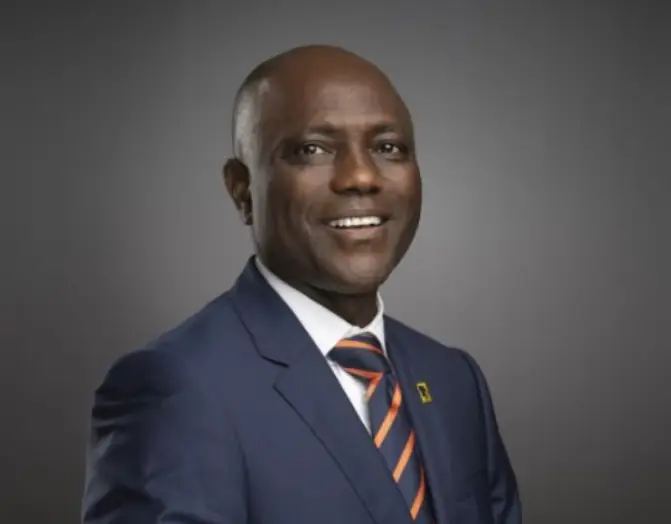
Olusegun Alebiosu has been appointed as the Acting Managing Director/Chief Executive Officer of First Bank of Nigeria Limited (FirstBank Group), effective April 2024.
Alebiosu steps into this pivotal role from his previous position as the Executive Director, Chief Risk Officer, and Executive Compliance Officer, a position he held since January 2022.
Alebiosu brings to the helm of FirstBank over 28 years of extensive experience in the banking and financial services industry. His expertise spans various domains including credit risk management, financial planning and control, corporate and commercial banking, agriculture financing, oil and gas, transportation, and project financing.
READ ALSO: JUST IN: Access Holdings Names New Acting CEO
Having embarked on his professional journey in 1991 with Oceanic Bank Plc. (now EcoBank Plc.), Alebiosu has held several notable positions in esteemed financial institutions.
Prior to joining FirstBank in 2016, he served as Chief Risk Officer at Coronation Merchant Bank Limited, Chief Credit Risk Officer at the African Development Bank Group, and Group Head of Credit Policy & Deputy Chief Credit Risk Officer at United Bank for Africa Plc.
Alebiosu’s academic credentials further enrich his professional profile. He is an alumnus of the Harvard School of Government and holds a Bachelor’s degree in Industrial Relations and Personnel Management. Additionally, he obtained a Master’s degree in International Law and Diplomacy from the University of Lagos, as well as a Master’s degree in Development Studies from the London School of Economics and Political Science.
READ ALSO: Meet Newly Appointed Union Bank CEO
A distinguished member of various professional bodies, including the Institute of Chartered Accountants (FCA), Nigeria Institute of Management (ANIM), and Chartered Institute of Bankers of Nigeria (CIBN), Alebiosu is renowned for his commitment to excellence and ethical practices in the banking sector.
Beyond his professional endeavors, Alebiosu is known for his passion for golf and adventure. He is happily married and a proud parent.
With Alebiosu’s appointment, FirstBank of Nigeria Limited anticipates continued growth and innovation under his leadership, reinforcing its position as a leading financial institution in Nigeria and beyond.
Business
CBN Gives New Directive On Lending In Real Estate
Published
6 days agoon
April 17, 2024By
Editor
The Central Bank of Nigeria, CBN, has released a new regulatory directive to enhance lending to the real sector of the Nigerian economy.
The directive, issued on April 17, 2024, with reference number BSD/DIR/PUB/LAB/017/005 and signed by the Acting Director of Banking Supervision, Adetona Adedeji, signifies a notable shift in the bank’s policy towards a more contractionary approach.
In line with the new measures, the CBN has reduced the loan-to-deposit ratio by 15 percentage points, down to 50 per cent.
This move aligns with the CBN’s current monetary tightening policies and reflects the increase in the Cash Reserve ratio rate for banks.
READ ALSO: JUST IN: CBN Gov Sacks Eight Directors, 32 Others
The LDR is a metric used to evaluate a bank’s liquidity by comparing its total loans to its total deposits over the same period, expressed as a percentage.
An excessively high ratio may indicate insufficient liquidity to meet unexpected fund requirements.
All Deposit Money Banks are now mandated to adhere to this revised LDR.
The CBN has stated that average daily figures will be utilised to gauge compliance with this directive.
Furthermore, while DMBs are encouraged to maintain robust risk management practices in their lending activities, the CBN has committed to continuous monitoring of adherence and will adjust the LDR as necessary based on market developments.
READ ALSO: JUST IN: CBN Increases Interest Rate To 24.75%
Adedeji has called on all banks to acknowledge these modifications and adjust their operations accordingly. He emphasised that this regulatory adjustment is anticipated to significantly influence the banking sector and the wider Nigerian economy.
The circular read in part, “Following a shift in the Bank’s policy stance towards a more contractionary approach, it is crucial to revise the loan-to-deposit ratio policy to conform with the CBN’s ongoing monetary tightening.
“Consequently, the CBN has decided to decrease the LDR by 15 percentage points to 50 per cent, proportionate to the rise in the CRR rate for banks.
“All DMBs must maintain this level, and it is advised that average daily figures will still be applied for compliance assessment.
“While DMBs are urged to sustain strong risk management practices concerning their lending operations, the CBN will persist in monitoring compliance, reviewing market developments, and making necessary adjustments to the LDR. Please be guided accordingly.”

The Dangote Petroleum Refinery has announced a reduction in the price of Automotive Gas Oil, popularly called diesel, from N1,200/litre to N1,000/litre.
It announced this in a statement issued on Tuesday by its spokesperson, Nduka Chiejina.
The statement read in part, “In an unprecedented move, Dangote Petroleum Refinery has announced a further reduction of the price of diesel from N1,200 to N1,000/litre.
READ ALSO: NNPP Faction Suspends Kano Governor For Six Months
“While rolling out the products, the refinery supplied at a substantially reduced price of N1,200/litre three weeks ago, representing over 30 per cent reduction from the previous market price of about N1,600/litre.
“This significant reduction in the price of diesel at Dangote Petroleum Refinery is expected to positively affect all the spheres of the economy and ultimately reduce the high inflation rate in the country.”
According to The PUNCH report, last week, oil marketers called on the refinery to reduce its diesel price, as they urged managers of the facility to sell at N850/litre.
Details later…

Nigeria Air: EFCC Arrests Ex-Buhari’s Minister Over N8bn Fraud
BREAKING: EFCC Freezes Over 300 Accounts Over Suspicious FX Flows

BREAKING: EFCC Chair Vows To Follow Yahaya Bello’s Prosecution To Conclusion
Trending

 News5 days ago
News5 days ago‘Have Some Conscience’ – Lady Tackles Salvation Ministries Founder, Ibiyeomie, Over 20% Of Salary As Offering Preaching [VIDEO]

 News5 days ago
News5 days agoAPC Debunks Viral Video, Says Presidency Not After Ganduje

 Metro5 days ago
Metro5 days agoPolice Rescue Three Toddlers Locked Up In Lagos Home

 Entertainment22 hours ago
Entertainment22 hours agoBridesmaids’ Dance At Wedding Causes Stir On Social Media [VIDEO/PHOTOS]

 Politics2 days ago
Politics2 days agoEdo Guber: Akoko-Edo PDP Leaders Meet In Igara, Describe Ighodalo, Ogie As ‘Perfect Match’

 Headline4 days ago
Headline4 days agoBest Airports In Africa For 2024 Named, Nigeria Missing [Full List]

 News3 days ago
News3 days agoFoundation Advocates Empowerment Of Women, Youth In Nigeria

 Metro4 days ago
Metro4 days agoBREAKING: Protests As Gunmen Kill 12 In Plateau Village

 Headline5 days ago
Headline5 days agoUPDATED: Defence Chief, Nine Others Die In Kenya Military Helicopter Crash

 Metro21 hours ago
Metro21 hours agoVIDEO: ‘UNN Lecturer’ Caught Pants Down With Married Student


